New Delhi – In a powerful presentation that has sent ripples through diplomatic circles, Foreign Secretary Vikram Misri unveiled concrete evidence of Pakistan’s direct involvement with designated terrorist organizations. During a press conference in New Delhi on May 8, 2025, Vikram Misri displayed photographs showing UN and US-designated terrorists receiving state honors in Pakistan, effectively dismantling Islamabad’s longstanding denials of terror links.
“If only civilians were killed in these attacks, I wonder what message this picture actually sends to all of you,” Vikram Misri stated, as the Ministry of External Affairs released photos from funerals conducted for those killed in India’s Operation Sindoor strikes. The operation had targeted terrorist facilities in Pakistan following the deadly Pahalgam attack that claimed 26 lives last month.
Vikram Misri’s presentation comes at a critical juncture in India-Pakistan relations, with tensions escalating following a series of military exchanges between the two nuclear-armed neighbors. His evidence-based approach has strengthened India’s position internationally while exposing Pakistan’s duplicity on terrorism.
Photographic Evidence Presented by Vikram Misri Shows Terrorists Receiving State Honors
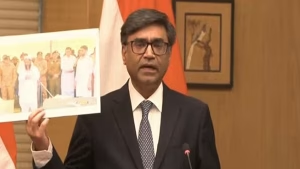
The most damning evidence presented by Vikram Misri was a photograph showing US-designated terrorist Hafiz Abdur Rauf leading funeral prayers for those killed in the Indian strikes on Lashkar-e-Taiba’s headquarters in Muridke, approximately an hour from Lahore. The image, widely circulated by the MEA, shows Abdur Rauf flanked by what appear to be Pakistani military officers.
“As far as we are concerned, the individuals eliminated at these facilities were terrorists. Giving terrorists state funerals may be a practice in Pakistan. It doesn’t seem to make much sense to us,” Vikram Misri remarked, highlighting the contradiction in Pakistan’s official stance.
Also Read: Delhi Security Alert: Bold Safety Measures Implemented Amid Tensions
The photograph shared by Vikram Misri reveals bodies draped in Pakistani national flags, indicating state honors being bestowed upon individuals killed at terrorist facilities. This visual evidence directly contradicts Pakistan’s claims that India’s strikes targeted innocent civilians rather than terrorist infrastructure.
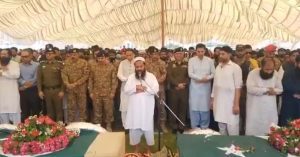

Terrorist Leadership Networks Exposed in Vikram Misri’s Briefing
During his comprehensive briefing, Vikram Misri meticulously outlined the terror networks operating from Pakistani soil. The Foreign Secretary explained that ‘Hafiz’ Abdur Rauf was designated a Specially Designated Global Terrorist by the U.S. Treasury on November 24, 2010, and works directly under Lashkar-e-Taiba chief Hafiz Saeed, the mastermind behind the 2008 Mumbai attacks.
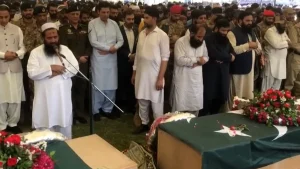

Vikram Misri further elaborated that the Falah-i-Insaniyat-Foundation (FIF), ostensibly a charitable organization, functions as a fundraising offshoot of LeT and was banned by the U.S. on the same day as Abdur Rauf’s designation. According to information shared by Vikram Misri, Abdur Rauf serves as LeT’s chief fundraiser and spokesperson while maintaining his public persona as a local cleric who openly campaigns for Pakistan to annex Kashmir.
The Foreign Secretary’s briefing also touched upon the Jaish-e-Mohammad leadership casualties in the strikes on Bahawalpur. Though Vikram Misri did not directly confirm these reports, he acknowledged that India had information suggesting several family members of JeM chief Masood Azhar, including his brother and JeM commander Abdul Rauf Azhar, were killed in the Indian Air Force strikes.
The Resistance Front’s Pakistan Connection Highlighted by Vikram Misri
Perhaps the most significant revelation in Vikram Misri’s presentation concerned The Resistance Front (TRF), the terrorist group that initially claimed responsibility for the Pahalgam attack before mysteriously retracting its statement. The Foreign Secretary stated that Pakistan had inadvertently exposed its links to TRF through its diplomatic maneuvering at the United Nations.
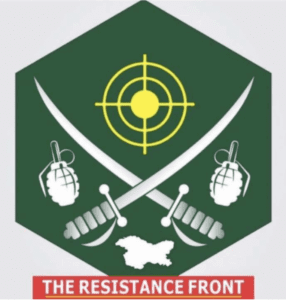

“It is interesting that Pakistan insisted on omitting TRF’s name from the UNSC resolution passed on April 25,” Vikram Misri noted, referring to Pakistan’s Deputy Prime Minister and Foreign Minister’s own admission in their parliament that they had “watered down” the UNSC draft resolution proposed by the U.S.
Vikram Misri revealed that India had reported the TRF’s activities to the UN 1267 Monitoring team on multiple occasions, building a case for the group’s designation as a terrorist organization. The Foreign Secretary’s comments suggest that India is preparing to push for international sanctions against TRF, adding another dimension to the diplomatic offensive being led by Vikram Misri and his team.
International Sanctions Push Following Vikram Misri’s Revelations
The evidence presented by Vikram Misri has strengthened India’s position for pushing additional international sanctions against Pakistan-based terrorist groups and their leadership. During an all-party meeting in Delhi on Thursday, opposition members called for India to request that the United States designate the TRF as a Foreign Terrorist Organization (FTO).
Vikram Misri’s presentation has also revitalized discussions about bringing Pakistan back on the Financial Action Task Force’s (FATF) grey-list for allowing designated terrorists to operate freely despite international sanctions. Pakistan had previously been removed from this list after claiming to have taken steps to curb terrorist financing.
The diplomatic offensive spearheaded by Vikram Misri comes at a time when Pakistan faces growing international scrutiny over its counterterrorism commitments. By presenting concrete evidence of state complicity with designated terrorists, Vikram Misri has effectively undermined Pakistan’s narrative of being a victim rather than sponsor of terrorism.
Historical Context of Terrorist Leaders Mentioned in Vikram Misri’s Briefing
The individuals mentioned in Vikram Misri’s presentation have long histories of involvement in terrorism against India. Abdul Rauf Azhar, whose death was reported in the strikes, was the operational commander of JeM and mastermind of the IC-814 hijacking in 1999. This hijacking ended with India releasing Masood Azhar along with other terrorists in exchange for hostage passengers.
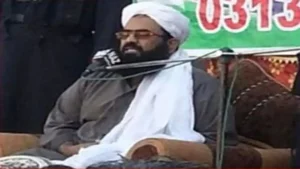

Vikram Misri noted that since this release, the JeM leadership has been responsible for numerous attacks, including the 2001 Parliament attack, the 2016 Pathankot airbase attack, and the 2019 Pulwama bombing that brought India and Pakistan to the brink of war.
While the JeM and its leader Masood Azhar have been designated as terrorists by the UN Security Council, Vikram Misri pointed out that China has repeatedly blocked India’s attempts to list Abdul Rauf Azhar in the 1,267-strong list for sanctioned terrorists, despite the U.S. having placed him on its Special Designations list in December 2010.
International Reaction to Vikram Misri’s Evidence
The international community has taken notice of the evidence presented by Foreign Secretary, with several countries expressing concern over Pakistan’s continued support for terrorist organizations. Diplomatic sources suggest that Vikram Misri’s presentation has prompted several Western nations to reassess their engagement with Pakistan on counterterrorism issues.
Security analysts have praised Vikram Misri’s approach of using concrete evidence rather than mere allegations, noting that the photographic evidence makes Pakistan’s denials increasingly untenable. The Foreign Secretary’s methodical dismantling of Pakistan’s narrative has been described as a significant diplomatic victory for India.
Final Word: Foreign Secretary’s Diplomatic Offensive Gains Momentum
As tensions between India and Pakistan continue to simmer following Operation Sindoor and the subsequent military exchanges, the diplomatic offensive led by Foreign Secretary appears to be gaining significant traction internationally. By exposing Pakistan’s state support for designated terrorist organizations with concrete evidence, the Foreign Secretary has strengthened India’s position while isolating Pakistan diplomatically.
The revelations made by Foreign Secretary are expected to feature prominently in upcoming international forums, including the United Nations, where India is likely to push for additional sanctions against Pakistan-based terror groups and their leadership. As this diplomatic campaign unfolds, the evidence presented by Foreign Secretary will undoubtedly play a crucial role in shaping the international community’s approach to terrorism emanating from Pakistan.

